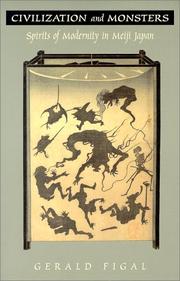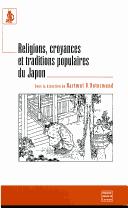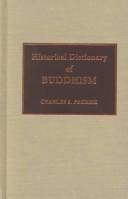| Listing 1 - 10 of 10 |
Sort by
|
Book
ISBN: 9782262024895 2262024898 Year: 2008 Publisher: Paris Perrin
Abstract | Keywords | Export | Availability | Bookmark
 Loading...
Loading...Choose an application
- Reference Manager
- EndNote
- RefWorks (Direct export to RefWorks)
Une sainte diffère peu d'une magicienne ou d'une sorcière. L'une a langue avec Dieu quand les deux autres font commerce avec Satan. Jeanne d'Arc ne sera-t-elle pas condamnée pour sorcellerie ? Ces êtres maléfiques ou pas, bons ou mauvais, qui savent les secrets des hommes, connaissent les herbes et parlent aux cieux inquiètent leurs contemporains et, du coup, exercent sur eux un vrai pouvoir. L'histoire des superstitions au Moyen Age s'ouvre chez les Celtes - au temps du paganisme et des idoles -, et s'achève à l'ombre des bûchers sur lesquels des sorcières furent brûlées par milliers. Les mentalités évoluent lentement. Plusieurs siècles sont nécessaires, qui voient fleurir les pratiques magiques pour conjurer un sort, changer les destins, ou concurrencer les usages religieux et le pouvoir des reliques. Historien, spécialiste des mentalités, Jean Verdon raconte ici la longue histoire de ces traditions jugées populaires mais suivies par tous, qu'écrivains, magistrats et savants n'auront de cesse de combattre, en une véritable guerre des croyances.
Superstition --- History --- Mediaeval History --- Popular Beliefs --- Superstitions --- History. --- Folk beliefs --- Traditions --- Folklore --- Religion --- Superstition - France - History --- Superstition - Europe - History
Book
ISBN: 9782913217287 2913217281 Year: 2011 Volume: *7 Publisher: Paris : Diffusion De Boccard
Abstract | Keywords | Export | Availability | Bookmark
 Loading...
Loading...Choose an application
- Reference Manager
- EndNote
- RefWorks (Direct export to RefWorks)

ISBN: 0822324180 0822323842 Year: 1999 Publisher: Durham Duke university press
Abstract | Keywords | Export | Availability | Bookmark
 Loading...
Loading...Choose an application
- Reference Manager
- EndNote
- RefWorks (Direct export to RefWorks)
J1723 --- J4150 --- J5500.70 --- J4140.70 --- J4000.70 --- Folklore --- -Japanese literature --- -Folk beliefs --- Folk-lore --- Traditions --- Ethnology --- Manners and customs --- Material culture --- Mythology --- Oral tradition --- Storytelling --- Japan: Religion in general -- primitive religions -- general popular beliefs and folk religion --- Japan: Sociology and anthropology -- customs, folklore and culture --- Japan: Literature -- history and criticism -- modern, Kindai (1850s- ), bakumatsu, Meiji, Taishō --- Japan: Sociology and anthropology -- cultural history -- Kindai (1850s- ), bakumatsu, Meiji, Taishō --- Japan: Social history, history of civilization -- Kindai (1850s- ), bakumatsu, Meiji, Taishō --- Japan --- Civilization --- -Folklore --- Japanese literature --- -Japan: Religion in general -- primitive religions -- general popular beliefs and folk religion --- -J1723 --- Folk-lore, Japanese --- J4150.70 --- Regions & Countries - Asia & the Middle East --- History & Archaeology --- East Asia
Book
ISBN: 1280488808 9786613584038 1846158761 184383555X Year: 2010 Publisher: Woodbridge ; Rochester, N.Y. : Boydell Press,
Abstract | Keywords | Export | Availability | Bookmark
 Loading...
Loading...Choose an application
- Reference Manager
- EndNote
- RefWorks (Direct export to RefWorks)
Although the popular myth of Cornish wrecking is well-known within British culture, this book is the first comprehensive, systematic inquiry to separate out the layers of myth from the actual practices. Weaving in legal, social and cultural history, it traces the development of wreck law - the right to salvage goods washed on shore - and explores the responses of a coastal populace who found their customary practices increasingly outside the law, especially as local individual rights were being curtailed and the role of centralised authority asserted.
This ground breaking study also considers the myths surrounding wrecking, showing how these developed over time, and how moral attitudes towards wrecking changed. Overall, the picture of evil wreckers deliberately luring ships onto the rocks is dispelled, to be replaced by a detailed picture of a coastal populace - poor and gentry alike - who were involved in a multi-faceted, sophisticated coastal practice and who had their own complex popular beliefs about the harvest and salvage of goods washing ashore from shipwreck.
CATHRYN J. PEARCE holds a PhD in Maritime History from Greenwich Maritime Institute. A former associate professor of history with the University of Alaska Anchorage's Kenai Peninsula College, she is now with University Campus Suffolk where she continues to research on the relationship of coastal people with the sea.
Salvage --- Shipwrecks --- Wreckers (Plunderers of ships) --- Wreckers (of ships) --- Persons --- Marine disasters --- Wrecks --- Adventure and adventurers --- Marine accidents --- Voyages and travels --- Collisions at sea --- Contracts, Maritime --- International law --- Maritime law --- History --- Law and legislation --- Cornwall (England : County) --- Cornwall (County) --- County of Cornwall (England) --- Kernow (England) --- History, Naval --- Cornish coast. --- Cornish wreckers. --- coastal populace. --- customary practices. --- harvest. --- popular beliefs. --- salvage of goods. --- shipwrecks.

ISBN: 2706814322 9782706814327 Year: 2000 Publisher: Paris: Maisonneuve et Larose,
Abstract | Keywords | Export | Availability | Bookmark
 Loading...
Loading...Choose an application
- Reference Manager
- EndNote
- RefWorks (Direct export to RefWorks)
A une époque de Zen au rabais, déformé et méconnaissable, qui intéresse jusqu'à la publicité dans un monde avide de spiritualité orientale, la " religion japonaise " - shintô ? Bouddhisme ? Les deux ? - Reste encore, à plus d'un égard, un terrain à découvrir. L'ambition de cette chrestomathie est de faire connaître au lecteur les courants majeurs de l'histoire religieuse du Japon, allant de " l'âge des dieux ", où " arbres et plantes disaient des choses " [=partie A] jusqu'au seuil du Moyen Age, i.e. la fin du XIIe siècle qui vit l'éclosion du syncrétisme shintô- bouddhique dans le " pays des prodiges du Sutra du Lotus " [=partie B]. Les auteurs proposent donc - loin des synthèses expéditives ou des regards particularisants -, une initiation concrète et immédiate à la mentalité religieuse japonaise, en s'appuyant sur un choix de textes littéraires, historiques, liturgiques et doctrinaux, presque tous traduits pour la première fois en langue française. Narration mythologique, prières et chants rituels, histoires morales et miraculeuses aux personnages fort attachants [notables, clergé et petit peuple], hymnes en éloge aux bouddhas et bodhisattvas : tout concourt à familiariser le lecteur avec une pensée parfois lointaine, parfois étrangement proche, voire universelle ; pensée propre à l'homme dans sa nature, ses faiblesses et ses aspirations religieuses de tout temps.
Japan --- Japon --- Religion --- J1700 --- J1723 --- Japan: Religion -- general and history --- Japan: Religion in general -- primitive religions -- general popular beliefs and folk religion --- culture populaire --- Folklore --- Church attendance. --- Shinto - Customs and practices. --- Buddhism - Japan - History. --- Mythology, Japanese. --- Folk religion. --- Pratique religieuse - Japon - Histoire. --- Shinto - Coutumes et pratiques - Histoire. --- Bouddhisme - Japon - Histoire. --- Mythologie japonaise - Histoire. --- Japan. --- Japan - Religion. --- Japan - Church history. --- Japon - Vie religieuse. --- Japon - Religion. --- Japon - Histoire religieuse. --- Japan: Religion in general --- Shinto --- Buddhism --- Pratique religieuse --- Bouddhisme --- Mythologie japonaise

ISBN: 0810826984 Year: 1993 Volume: 1 Publisher: Lanham ; London Scarecrow Press
Abstract | Keywords | Export | Availability | Bookmark
 Loading...
Loading...Choose an application
- Reference Manager
- EndNote
- RefWorks (Direct export to RefWorks)
Dictionaries [Polyglot ] --- Dictionnaires multilingues --- Dictionnaires polyglottes --- Polyglot dictionaries --- Veeltalige woordenboeken --- Woordenboeken [Veeltalige ] --- 294.3 <03> --- Buddhism --- -Buddhism --- -Dictionaries, Polyglot --- Dictionaries, Multilingual --- Languages, Modern --- Multilingual dictionaries --- Encyclopedias and dictionaries --- Language and languages --- Buddha and Buddhism --- Lamaism --- Ris-med (Lamaism) --- Religions --- Boeddhisme--(algemeen)--Naslagwerken. Referentiewerken --- Bibliography --- Dictionaries --- -Polyglot --- Polyglot --- Dictionaries, Polyglot. --- Bibliography. --- Polyglot. --- 294.3 <03> Boeddhisme--(algemeen)--Naslagwerken. Referentiewerken --- 294.3 <03> Boeddhisme:--verder in te delen zoals 291.1/.8--Naslagwerken. Referentiewerken --- Boeddhisme:--verder in te delen zoals 291.1/.8--Naslagwerken. Referentiewerken --- Dictionaries, Polyglot --- Dictionaries&delete& --- Buddhist scriptures --- Buddhist history --- historical development --- Buddhism in the Western world --- religious thought --- practices --- rituals --- popular beliefs --- soteriology --- mythology --- sacred places --- social order --- art
Book
ISBN: 0262370972 0262370980 0262544245 Year: 2022 Publisher: Cambridge, Massachusetts : The MIT Press,
Abstract | Keywords | Export | Availability | Bookmark
 Loading...
Loading...Choose an application
- Reference Manager
- EndNote
- RefWorks (Direct export to RefWorks)
"In an increasingly hectic world, walking simulators provide a chance for a meditative online experience. Wandering Games will be the first book to explore this genre"--
Computer games / online games: strategy guides --- Virtual reality --- Popular beliefs & controversial knowledge --- walking simulator --- performance --- indie --- pilgrimage --- colonialism --- death --- gender --- work --- late capitalism --- interdisciplinary --- Return of the Obra Dinn --- Eastshade --- Ritual of the Moon --- 80 Days --- Heaven's Vault --- Death Stranding --- The Last of Us Part --- The Last of Us Part II --- Walking simulator games. --- Video games. --- GAMES & ACTIVITIES / Video & Mobile --- COMPUTERS / Virtual & Augmented Reality --- SOCIAL SCIENCE / Popular Culture --- Computer games --- Electronic games --- Internet games --- Television games --- Videogames --- Games --- Video wandering games --- Walking --- Wandering games, Video --- Video games
Book
ISBN: 0262372347 0262544709 0262372355 Year: 2022 Publisher: Cambridge, Massachusetts : The MIT Press,
Abstract | Keywords | Export | Availability | Bookmark
 Loading...
Loading...Choose an application
- Reference Manager
- EndNote
- RefWorks (Direct export to RefWorks)
"A history of the arcade in British culture"--
Computer games / online games: strategy guides --- English Civil War --- Popular beliefs & controversial knowledge --- Amusement Arcade --- Amusements --- Britain --- British --- Seaside --- Video Game --- Videogame --- Gambling --- Showmen --- Traveling Showmen --- Traveling Fair --- Fairground --- Midway --- Bingo --- Fruit Machine --- Pin Table --- Allwin --- Crompton --- Coin Machine --- Amusement Caterer --- BACTA --- SEGA --- Copyright --- Space Invaders --- Atari --- Pong --- Ping Pong --- Defender --- Bell Fruit --- Alca --- Penny Falls --- Mafia --- Tax --- FOBT --- Gaming --- Recreation centers --- Video arcades --- History. --- GAMES & ACTIVITIES / Video & Mobile --- HISTORY / Europe / Great Britain / General --- SOCIAL SCIENCE / Popular Culture --- Amusement arcades (Video arcades) --- Arcades, Video --- Video game arcades --- Canteens (Recreation centers) --- Recreation centres --- Recreation facilities --- Recreational centers --- Recreational facilities --- Community centers --- Recreation areas --- Sports facilities
Book
ISBN: 9781906876524 1906876525 9786613663368 9004212604 1280686421 9789004212602 9781280686429 6613663360 Year: 2011 Publisher: Folkestone, Kent, UK
Abstract | Keywords | Export | Availability | Bookmark
 Loading...
Loading...Choose an application
- Reference Manager
- EndNote
- RefWorks (Direct export to RefWorks)
Focuses on traditional monster art and its links to post-war animation, sequential art, and Japanese cinema by adapting Western art historical concepts and methodology.
Comic books, strips, etc. --- Animated films --- Motion pictures --- Monsters in art. --- Art, Japanese --- Bandes dessinées --- Dessins animés --- Cinéma --- Monstres dans l'art --- Art japonais --- History. --- Histoire --- J1723 --- J4150 --- J6030 --- J6200 --- J5960 --- J6839 --- Japan: Religion in general -- primitive religions -- general popular beliefs and folk religion --- Japan: Sociology and anthropology -- customs, folklore and culture --- Japan: Art and antiquities -- themes, symbolism and iconography --- Japan: Art and antiquities -- painting and drawing --- Japan: Literature -- modern fiction and prose -- manga --- Japan: Media arts and entertainment -- cinema --- J6848 --- Japan: Media arts and entertainment -- anime --- Comic books, strips, etc --- Monsters in art --- Monoha (Group of artists) --- Animated cartoons (Motion pictures) --- Animated videos --- Cartoons, Animated (Motion pictures) --- Motion picture cartoons --- Moving-picture cartoons --- Caricatures and cartoons --- Abstract films --- Animation (Cinematography) --- Animation cels --- History and criticism --- History --- History and criticism.
Book
ISBN: 1282772473 9786612772474 0520942671 9780520942677 0520253612 9780520253612 0520253620 9780520253629 9780520253612 9780520253629 Year: 2009 Publisher: Berkeley University of California Press
Abstract | Keywords | Export | Availability | Bookmark
 Loading...
Loading...Choose an application
- Reference Manager
- EndNote
- RefWorks (Direct export to RefWorks)
Water sprites, mountain goblins, shape-shifting animals, and the monsters known as yôkai have long haunted the Japanese cultural landscape. This history of the strange and mysterious in Japan seeks out these creatures in folklore, encyclopedias, literature, art, science, games, manga, magazines, and movies, exploring their meanings in the Japanese cultural imagination and offering an abundance of valuable and, until now, understudied material. Michael Dylan Foster tracks yôkai over three centuries, from their appearance in seventeenth-century natural histories to their starring role in twentieth-century popular media. Focusing on the intertwining of belief and commodification, fear and pleasure, horror and humor, he illuminates different conceptions of the "natural" and the "ordinary" and sheds light on broader social and historical paradigms-and ultimately on the construction of Japan as a nation.
Animals, Mythical --- Supernatural. --- Spirits. --- Invisible world --- Supernatural --- Fear of spirits --- Religion --- Miracles --- Creatures, Fabled --- Fabled creatures --- Fabulous animals --- Fabulous creatures --- Fantastic animals --- Fictitious animals --- Imaginary animals --- Legendary animals --- Mythical animals --- Zoological mythology --- Animals --- Dragons --- Mythology --- Japan --- al-Yābān --- Giappone --- Government of Japan --- Iapōnia --- I︠A︡ponii︠a︡ --- Japam --- Japani --- Japão --- Japon --- Japonia --- Japonsko --- Japonya --- Jih-pen --- Mư̄ang Yīpun --- Nihon --- Nihon-koku --- Nihonkoku --- Nippon --- Nippon-koku --- Nipponkoku --- Prathēt Yīpun --- Riben --- State of Japan --- Yābān --- Yapan --- Yīpun --- Zhāpān --- Япония --- اليابان --- يابان --- 日本 --- 日本国 --- Spirits --- J1723.80 --- J1723 --- J4120 --- J4150 --- J5620 --- Japan: Religion in general -- demonology --- Japan: Religion in general -- primitive religions -- general popular beliefs and folk religion --- Japan: Sociology and anthropology -- social psychology and social-cultural phemomena --- Japan: Sociology and anthropology -- customs, folklore and culture --- Japan: Literature -- folk tales, fairy tales, mukashibanashi, ghost stories --- Japan: Sociology and anthropology -- social psychology and social-cultural phenomena --- Jepun --- Yapon --- Yapon Ulus --- I︠A︡pon --- Япон --- I︠A︡pon Uls --- Япон Улс --- ayakashi. --- belief. --- commodification. --- demons. --- east asian cultural studies. --- horror. --- human electricity. --- humor. --- japan. --- japanese cultural imagination. --- japanese culture. --- japanese folklore. --- kanji. --- kokkuri. --- malevolent. --- mamono. --- minzokugaku. --- mischievous. --- mizuki shigeru. --- modernity. --- mononoke. --- monsters. --- mountain goblins. --- natural history. --- shape shifting animals. --- spirits. --- spooky stories. --- supernatural monsters. --- toriyama sekien. --- water sprites. --- yokai.
| Listing 1 - 10 of 10 |
Sort by
|

 Search
Search Feedback
Feedback About UniCat
About UniCat  Help
Help News
News